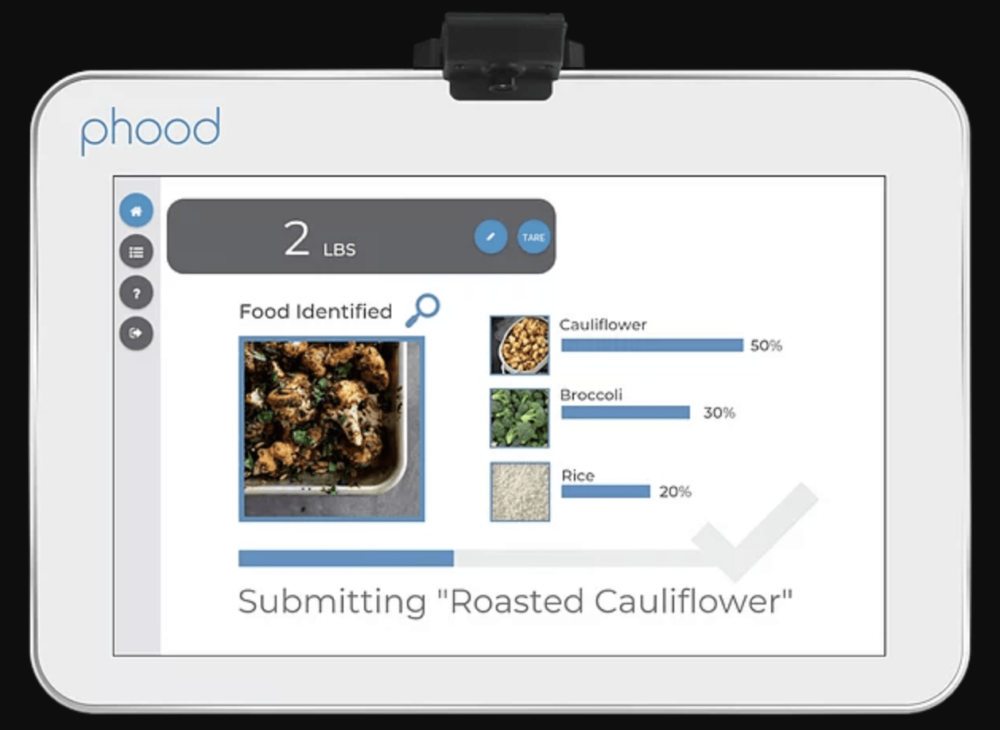Phood, a startup using artificial intelligence to reduce food waste in the foodservice industry, has raised $2 million in an an oversubscribed seed round co-led by New Stack Ventures and Story Ventures. The New York-based company began its fundraising journey when the Covid-19 pandemic was in full swing, which made for an interesting experience.
“Things are being held almost entirely virtually so we were not able to go and meet with an investor, have lunch, or go to their office. We were able to overcome some of those hurdles and actually had a really pleasurable experience,” Phood CEO Luc Dang told AFN.
The startup uses computer vision tech and AI to fight food waste in venues like ready-to-eat departments in grocery stores, university dining halls, healthcare facilities, and more.
Its back-of-house hardware and software system serves as a measurement tool for kitchen crews so they can understand exactly what is being wasted. This information can help them hone their ingredient orders or figure out which menu items are more popular than others.
“Our two main value propositions are around cost savings and labor reductions. If you look at a kitchen’s P&L, the single largest line item cost is food, followed closely by labor,” Dang said.
“We address both of these things through 50% volume reductions. We see up to 10% item profitability on key food items being served as well as labor reductions by up to 90% from existing shrink or inventory management practices.”
Phood’s customer base sees a return on their investment within the first 50 days of using its platform, he added.
The new funding will be used to expand the Phood’s offering to its latest “blue-chip” customer, Amazon‘s Whole Foods Market, which has been trialing the platform in several of its US East Coast locations.
Although Phood had a relatively pleasurable pandemic fundraising experience, the road ahead is not without its challenges.
“A lot of things within food service and the food industry altogether are just changing exponentially,” Dang said.
“Adoption is happening faster than ever. Technology and innovation are happening faster than ever. So we are working very closely with our customers to understand what their problems and needs are, which are ever-changing.”
Even though many investors closed their pocketbooks at the onset of Covid-19, in-store retail and restaurant tech has been serving up numerous funding deals of late – with a few acquisitions on the side. Pandemic-related movement restrictions caused double-digit growth in restaurant takeout orders alone. Third-party meal delivery services like Grubhub, DoorDash, and Uber Eats saw major spikes in usage, as did models built around the grocery delivery paradigm.
Questions loom about whether adoption will stick once Covid-19 subsides. But some argue that once consumers get accustomed to a new level of convenience, they won’t want to give it up. There will be some thinning of the crowd though, as restaurants that signed up for countless tech services figure out what works and what doesn’t.
Fortunately for Phood, food waste continues to be a hot topic – pandemic or not.
“It’s actually a bigger priority than it was before,” Dang said. “Food waste grows and thrives on uncertainty and the inability to understand how to forecast the demand for particular products. We see it in grocery stores with the difficulties to meet different behavioral shifts during the pandemic. When we talk about reopening, cost savings, labor reductions, and operational efficiencies are more important than ever.”





